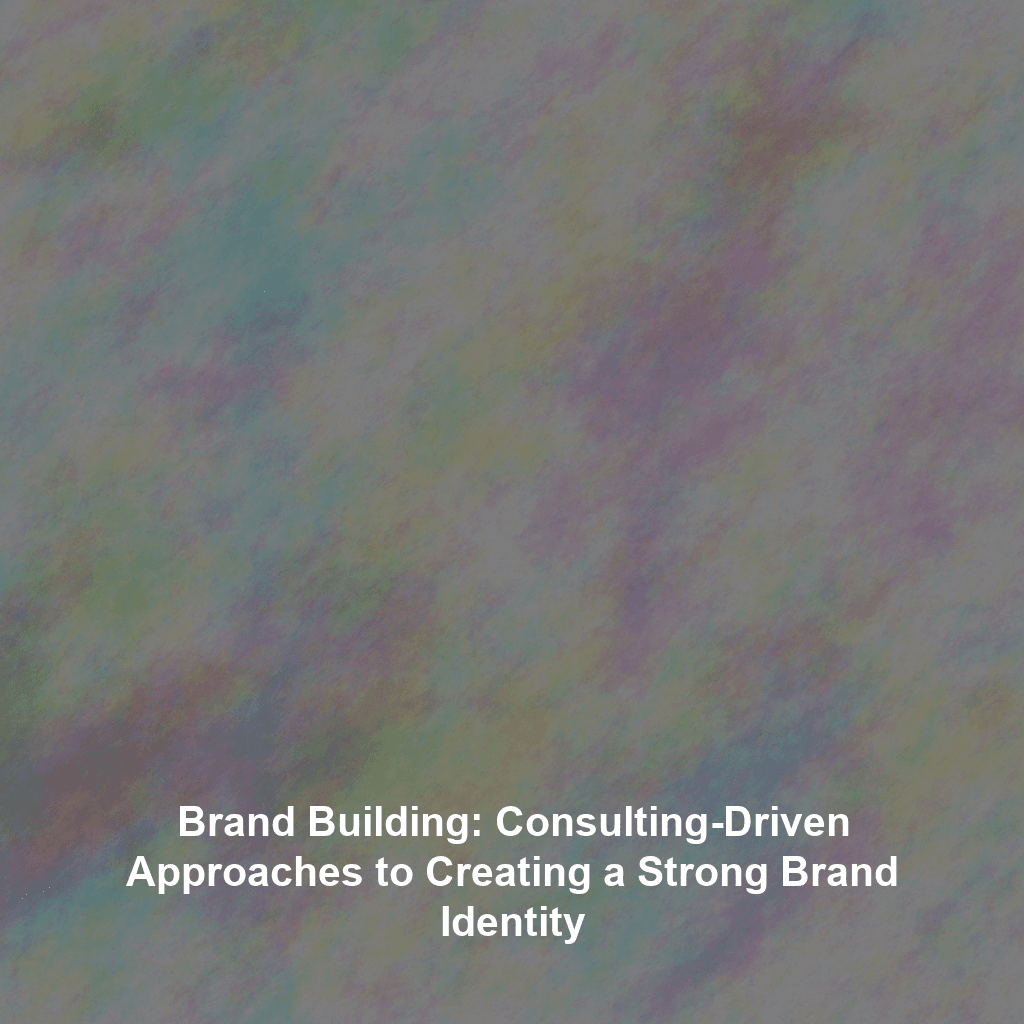But what does it really take to build a brand that resonates with your target audience and stands the test of time? The answer lies in a strategic, data-driven approach—one that goes far beyond catchy logos and clever slogans. This is where management consulting firms like McKinsey & Company, Boston Consulting Group (BCG), Oliver Wyman, and Bain & Company bring invaluable expertise to the table.
According to Forbes, brands with consistently presented identities are 3 to 4 times more likely to experience brand visibility and customer loyalty.
The Consulting Approach: More Than Just Marketing
Management consulting firms are often associated with high-level strategy, financial modeling, and operational excellence. However, their approach to brand building is equally rigorous and transformative. Unlike traditional marketing agencies, consulting firms architect entire brand ecosystems, ensuring that every element—from positioning to customer experience—is strategically aligned.
Three Pillars of Consulting-Driven Brand Building
- Brand Positioning: Defining where your brand sits in the minds of your target customers relative to competitors.
- Brand Messaging: Crafting compelling and consistent narratives that communicate your brand’s unique value proposition.
- Brand Experience: Ensuring every interaction a customer has with your brand reinforces the desired perception and builds trust.
The Harvard Business Review notes that brands that deliver a consistent experience across all touchpoints outperform competitors by up to 23% in revenue growth.
Brand Positioning: Finding Your Niche in a Crowded Market
Brand positioning is about carving out a unique and defensible space for your brand in the market. Consulting firms use a blend of analytical tools, deep market research, and creative thinking to understand:
- Target Audience: Comprehensive understanding of customer needs, motivations, and pain points through surveys, focus groups, and behavioral data analysis.
- Competitive Landscape: In-depth analysis of competitors’ strengths, weaknesses, and market share to identify opportunities for differentiation.
- Value Proposition: Articulating the unique benefits your brand offers and how it solves customer problems better than anyone else.
Real-World Anecdote: The Tech Startup Turnaround
Consider the case of a mid-sized SaaS company (let’s call them “TechNova”) struggling to gain traction in a crowded productivity software market. After engaging a top consulting firm, TechNova underwent a comprehensive brand audit. Through customer interviews and competitor benchmarking, consultants discovered that while TechNova’s features were on par with industry leaders, their messaging was generic and failed to address a key pain point: seamless integration with existing workflows.
By repositioning TechNova as the “integration-first productivity platform” and tailoring messaging to IT decision-makers, the company saw a 40% increase in qualified leads within six months. This strategic repositioning not only differentiated TechNova but also established them as a thought leader in their niche.
Learn more about brand positioning on Wikipedia.
Brand Messaging: Communicating Authentic Value
Once the brand’s position is established, the next step is to craft messaging that resonates emotionally and rationally with your audience. Consulting firms help organizations develop:
- Brand Story: A narrative that connects with customers on an emotional level, highlighting the brand’s journey, mission, and values.
- Key Messages: Clear, concise statements that communicate unique benefits and differentiators.
- Tone of Voice: A consistent style of communication reflecting the brand’s personality and values.
Anecdote: The Financial Services Rebrand
A regional credit union (anonymized as “SafeHarbor FCU”) faced declining membership among millennials. After partnering with a consulting firm, SafeHarbor’s leadership learned that younger consumers perceived credit unions as outdated and unresponsive. By reframing their messaging to emphasize digital innovation, community impact, and financial empowerment, and by sharing real member success stories, SafeHarbor reversed its membership decline. Within a year, millennial membership grew by 22%.
The American Marketing Association offers in-depth guides on brand messaging best practices.
Brand Experience: Delivering on the Brand Promise
Brand experience is the sum of every interaction a customer has with your brand, from the initial awareness stage to post-purchase support. Consulting firms help organizations design and deliver exceptional brand experiences by:
- Mapping Customer Journeys: Identifying and optimizing every touchpoint where customers interact with the brand.
- Designing Customer-Centric Processes: Streamlining systems to ensure alignment with customer needs and expectations.
- Empowering Employees: Training and equipping staff to deliver consistent, high-quality experiences.
Anecdote: The Retail Reinvention
A national retail chain (“UrbanStyle”) saw declining foot traffic and online engagement. After a consulting-led customer journey mapping exercise, UrbanStyle discovered friction points in both their in-store and online experiences. By redesigning store layouts, improving website navigation, and training staff in personalized service, UrbanStyle increased customer satisfaction scores by 35% and saw a 15% boost in repeat purchases.
The U.S. Small Business Administration (SBA.gov) provides actionable guides for strengthening your brand experience.
The Benefits of a Consulting-Driven Approach
Partnering with a management consulting firm to build your brand identity offers several key advantages:
- Data-Driven Insights: Decisions are grounded in rigorous analysis and market research, not just intuition.
- Strategic Alignment: Ensures brand building efforts support the overall business strategy for maximum impact.
- Objective Perspective: Consultants provide an unbiased, external viewpoint, identifying blind spots and new opportunities.
- Proven Methodologies: Leverage established frameworks and best practices honed across industries.
- Sustainable Results: Focus on building a resilient brand identity that adapts to changing market conditions.
The Federal Trade Commission (FTC) offers guidance for protecting your brand’s reputation in the digital age.
Common Pitfalls and How to Avoid Them
- Inconsistent Messaging: Ensure all departments and channels communicate the same core values and messages.
- Neglecting Employee Engagement: Employees are brand ambassadors; invest in training and internal communications.
- Ignoring Customer Feedback: Use feedback loops to continuously refine and improve the brand experience.
- Short-Term Thinking: Brand building is a marathon, not a sprint. Focus on long-term value creation.
Explore Nielsen’s research on brand loyalty to understand why consistency and authenticity matter more than ever.
Conclusion: A Strong Brand Identity Is Your Greatest Asset
In a world saturated with information and choices, a strong brand identity is essential for standing out from the crowd and building lasting relationships with customers. Building a brand is an ongoing process—one that requires vision, discipline, and a willingness to adapt. Starting with a consulting-driven approach provides a solid foundation for success.
By focusing on brand positioning, messaging, and experience, organizations can create brands that are not only recognizable but also deeply resonate with their target audiences. The result? Increased loyalty, advocacy, and sustainable business growth. Whether you engage McKinsey, BCG, Bain, Oliver Wyman, or other strategic partners, remember: a well-defined and executed brand strategy is an investment in your future.
- Inc. Magazine: Defining Your Brand
- CNBC: How to Build a Brand in 2023
- AMA: The Importance of Brand Experience
About the Author
This article was written by a team of branding and management consulting experts with experience advising Fortune 500 companies, non-profits, and high-growth startups. For more insights, visit our blog or connect with us on LinkedIn.
 Skip to content
Skip to content

